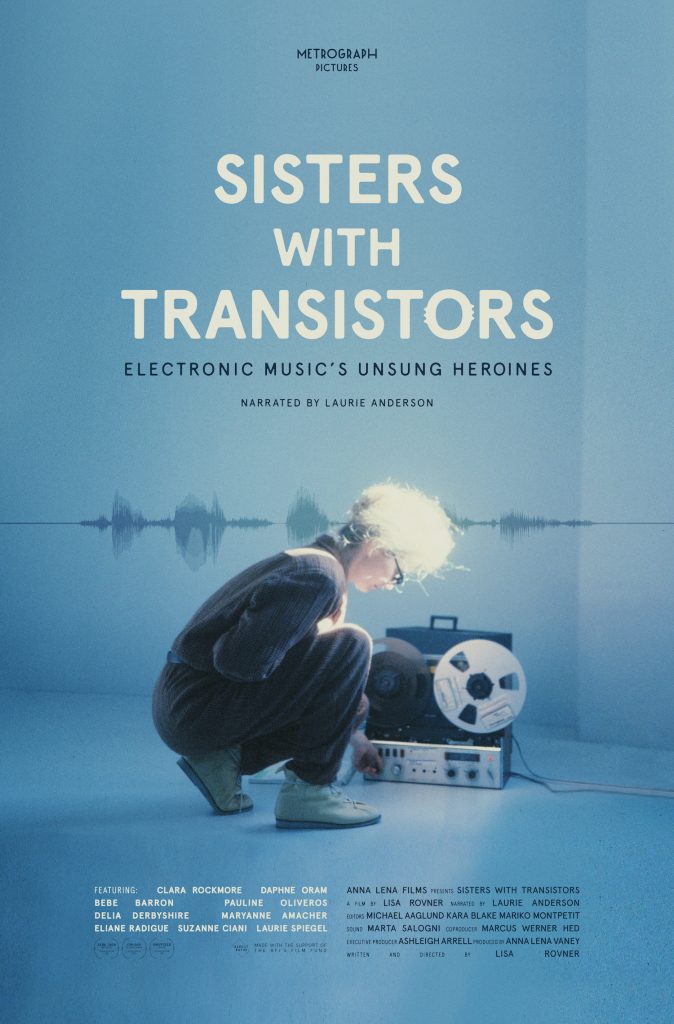
Forbidden Planet is considered a science-fiction classic for many reasons. Not least because the 1956 movie’s groundbreaking electronic score by Bebe Barron and her husband Louis was like nothing that had been heard in films to that point. The pioneering efforts of female composers like Barron, Delia Derbyshire, Pauline Oliveros and Laurie Spiegel have often been left out of the narrative about 20th-century electronic music.
Sisters With Transistors (Metrograph Pictures) hopes to change that by providing a corrective to the standard history. Narrated by Laurie Anderson, the documentary weaves together interviews both old and new with performances and commentary to showcase the musicality, inventive artistry and technical curiosity of these overlooked composers. As director Lisa Rovner notes, “I think this is really just the beginning of uncovering some of these women and not the end in any way.”
MAGNET spoke with Rovner about these artists, their recordings and trying to make music with a theremin.
The film is wonderful. It does a great job giving an overview of the work of these women and makes you want to find out more. It’s also beautifully put together. In addition to the interview footage, the imagery you selected to go with the snippets of musical pieces that get played is very evocative. What attracted you to this project? How did it come to be?
Well, I discovered a timeline of female pioneers of electronic music online, and I was just drawn to the photos of the woman featured, these women with machines. I’d heard of Delia Derbyshire, I’d heard of Eliane Radigue, I’d heard of their music, but I really knew nothing about the people themselves. I just knew that they made these beautiful sounds. When I started to dig into it, I realized that they were really amongst the greatest pioneers of modern sound. I reached out to them and was compelled to break the silence that surrounded their stories.
I guess the thing for me was the “bigger story.” I studied political science, so I’ve been thinking deeply about the politics behind storytelling and the stories that are told and the stories that are not told and the consequences of that. And so, in a way, all of my work revolves around confronting dominant narratives with counter narratives, and this story was such a unique emancipation story. I mean the thing that really nailed it for me was when I read something that Laurie Spiegel said that “this technology enabled women to be composers.” So it kind of clicked all these boxes like my interest in women’s studies, cultural studies, feminism and avant-garde music and art.

During parts of the 20th century, electronic composition was probably a rather small community. How aware were these women of the work being done by other women? I think Laurie Spiegel says in the film she knew no women composers. Suzanne Ciani also says there were no role models when she studied music. One of the musicians you quote states if “you don’t see role models you don’t know it’s possible for you.”
Some of them knew of each other because, as you mentioned, it is quite a small community of people who are interested in that kind of music. But yeah, I interviewed Alice Shields, who’s not in the film, and she said that she’d never heard of Daphne Oram, and she was sure that Daphne Oram had never heard of her. So yeah, there’s definitely a sadness there to think that these women weren’t connected more, but I think what’s so fascinating is that they still managed to work with electronic media and create completely new syncretic sounds and that they all were able to do what they did without role models. So it’s interesting. I mean, I definitely feel personally that as a female filmmaker, having female role models is essential to my work. I think I would have done it anyways, but that’s kind of the trick with role models. It took me a while to develop myself as a creator. I was kind of a late bloomer, and I guess that probably has something to do with the fact that I didn’t really see very many women creators.
Many people find electronic music too sterile or off-putting in some way, perhaps because they associate machines and technology with automation. This might be a banal observation, but listening to the work of these women, I’m struck by human it all sounds. How hand-crafted.
Yeah, I agree. I mean, Laurie Anderson talks about that in the film, that when she was making computer music that most people saw it as the dehumanization of music, but for her it was a liberation. Daphne Oram also talks about the fact that without the composer, there is no music coming from the machine. It’s interesting that you feel their music is more human. I think that they definitely played the part of composers when it comes to the music they were making with these machines.
In the 1970s and 1980s, there was a bit of a backlash against synths in rock music; they were perhaps seen as cheating and not representative of real playing. It’s ironic, since electric guitars are obviously electronic instruments. People fetishize the manual dexterity needed to play the electric guitar without appreciating the work that goes into creating purely electronic music.
Yeah. In the film, Clara Rockmore talks about needing to convince people that playing the theremin was a real artistic pursuit, and I think Delia Derbyshire was really credited with making electronic music beautiful, which I think clearly opened up a pathway for this music. The Eliane Radigue interview where she talks about people not considering her music to be music is from the ‘80s. So the backlash against electronic music—I feel like we’re beyond that now but maybe not completely.
The theremin is actually really hard to play. That’s the thing that’s so funny. I got a theremin recently, and I was like, “This is great, you don’t have to be a musician, you don’t have to know how to read notes, you can just move your hands and sculpt the air.” But it’s so hard to master. A lot of time and love went into those compositions!
—Bruce Fagerstrom
Sisters With Transistor is available on demand through May 20 on the Metrograph Pictures site.





